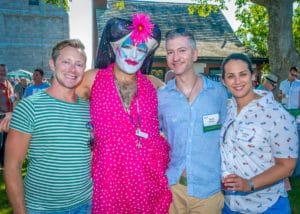
Protecting LGBTQ Families under Assisted Reproductive Technology Parentage Law in MA
Update March 2018 – We have collaborated with local advocates on an amended version of the bill that provides more protections for children born through assisted reproduction and surrogacy and that is gender and marital-status neutral. This proposal has been submitted to the Joint Judiciary Committee, and hope to receive a positive report by the Committee this Spring.
Background
GLAD supports the need for statutory reform in Massachusetts to address assisted reproductive technology (“ART”) and parentage, but has grave concerns about the language of S969, “An Act to Promote Family Stability,” a bill to reform the current statute.
At a hearing before the Joint Commission on the Judiciary on May 8, GLAD submitted testimony in opposition of the language of the reform bill for three main reasons:
- The bill revokes the provision upon which many same-sex families rely to establish legal parentage of their children.
- The bill too narrowly focuses on gestational surrogacy and does not address parentage and other forms of ART.
- The bill does not provide key protections for all parties involved in the surrogacy process.
Currently Massachusetts has one statute addressing assisted reproduction and parentage. It reads, “Any child born to a married woman as a result of artificial insemination with the consent of her husband, shall be considered the legitimate child of the mother and such husband.”
This provision ensures that a child’s legal parent is the husband, not the sperm donor, and that the husband’s parentage is secured automatically at birth.
Under this current statute, parentage is established by operation of law, and no court action or intervention is necessary. This clarity and security promotes the well-being of children by making it clear from birth who that child’s parents are, thereby ensuring they have access to all of the emotional and financial support that comes from having two legal parents.
This statute is also a critical protection for same-sex married couples. Because all Massachusetts’ statutes must be read as gender-neutral, the statute protects same-sex couples. When a married, lesbian couple conceives a child via ART and the child is born during the marriage, the law ensures that the non-biological mother is an equal, legal co-parent.
















